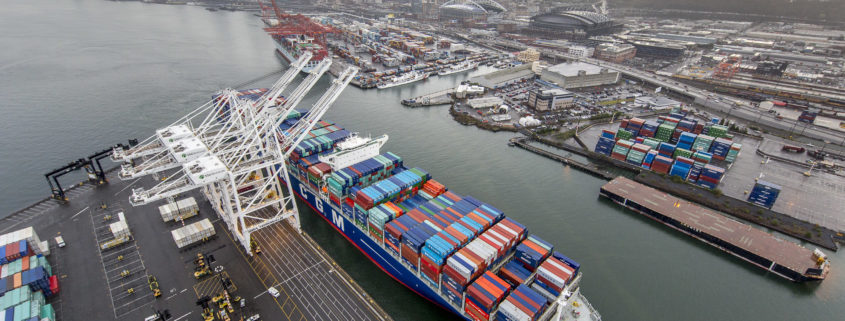Virus impact, added ‘blank sailings’ extended slowdown after Chinese New Year continue to disrupt container shipping
By Bruce Abbe, strategic adviser for trade and transportation
As reported in the Specialty Soya and Grains Alliance’s (SSGA) Enews last week, the coronavirus’ impact on global supply chains, particularly intermodal container shipping, is continuing to pose problems for container ag exporters.
China’s decision to keep millions of factory workers home longer after the normal Chinese New Year slowdown in an effort to contain the virus has led to an overall slowdown for container shipping. The outlook at this point is uncertain when a recovery will happen.
The Journal of Commerce reported Monday that U.S. Southeast ports are now bracing for a cargo volume drop in mid-March and April, due to the longer transit times for imports from Asia. The West Coast has already been experiencing the drop, including declines in import containers moving inland by rail. The container supply for exports is increasingly being affected. Port leaders at Los Angeles and Long Beach, the largest container port complex in the U.S., predicted declines of 12 to 15 percent for the first quarter, with a 25-percent decline in February. About 40 blank sailings were forecast by the Los Angeles port leader.
The American Association of Port Authorities (AAPA) reported that cargo volumes at the nation’s ports could be down 20 percent from a year earlier, due to disruptions from the virus. An AAPA statement noted a two-week latency period for virus symptoms, which is giving ports, health officials, customs and other government officials more time to prepare for screening and possible quarantining of crew members or travelers.
SSGA Member Shippers, Customers Feeling the Crunch
Several SSGA member freight forwarders and shippers confirm that the latest shipping crisis is hitting our exporters and their customers overseas.
Container availability is an issue in a number of locations, and somewhat uneven depending on the ocean carrier and their changing vessel schedules.
Some steamship lines have space and no containers, while other lines have containers available but no space, noted two shippers who use the Minneapolis rail terminals going to the Pacific Northwest (PNW).
Inland locations are feeling the pinch, notably Chicago, Kansas City, Ohio Valley and Minneapolis, another large shipper said.
“Equipment seems the same as always. None inland, and more at the ports – because there are no vessels for empties either,” advised one forwarder who arranges shipping from several ports. “Freight already was increasing. Not sure yet how it will all pan out.”
Another SSGA member noted, “We have five rail cars of wheat sitting on demurrage. I’m sure we aren’t the only ones.”
The next new bookings being taken by the carriers, several members noted, are in April and could be out further.
Another member shipper simply described the situation as “a huge mess.”
When asked if some destinations are getting hit harder than others by cancelled sailings, one shipper said Southeast Asia locations are feeling the pinch, particularly those served by feeder vessels handling transshipments.
Another member shipper pegged the real issue, “It is all about the customer’s inventory that translated directly to the seriousness” of the impact. More and more SSGA identity-preserved grain and oilseed exporters have been seeking to provide steady supply relationships with longer term customers.
Turning the Corner?
The president of the Port Authorities group told Freightwaves, “Things will rebound eventually and indeed we’re hearing news about factories that are coming back online in China and ports there are ramping back up to move the cargo…”
Indeed, a report in the South China Morning Post said both the government and business is eager to restart China’s economy. The prominent columnist said, after a month of extensive city lockdowns and travel restrictions in response to the COVID-19 outbreak, China’s workers and small businesses are now getting back to business as usual. He also warned that could spell risks of a second wave of the virus. The World Health Organization says the risk of the coronavirus spreading globally is ‘very high.’
A move to ramp up supply chains again is good news, the outlook globally is still uncertain for shippers.
In a normal year, the biggest container shipping conference in the world, the JOC’s Trans Pacific Maritime (TPM) Conference, would be taking place this week. The conference draws more than 2,000 ocean, rail, trucking and transportation technology executives to a four-day conclave at the Long Beach Convention Center. The conference was canceled Saturday following advice from health officials and the global increase in cases of the virus, including on the West Coast.







Leave a Reply
Want to join the discussion?Feel free to contribute!